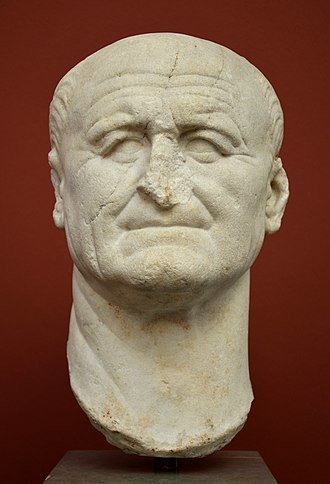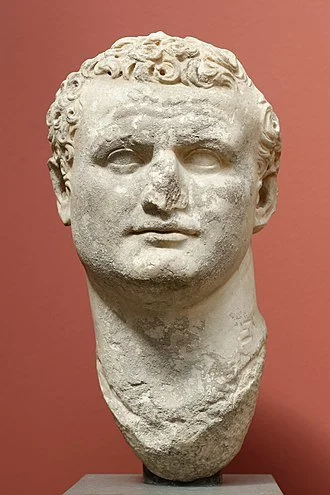Joseph was literally in a hole, in a cave beneath the town of Jotapata (modern Yodefat, near Nazareth) where he was the military commander. In 67 AD (CE), the Romans surrounded Jotapata and slaughtered most of the inhabitants as they tried to escape. When the Romans began searching the town for him, Joseph jumped into a dark hole and landed in the cave. Several other townsmen were already hiding there. They began debating what to do next.
Their options were limited. In the ancient Roman Empire, conquered people who rebelled against Roman rule were usually crucified. Those not killed were sold into slavery, a lucrative source of income for Roman commanders. Joseph and the others huddled in their cave and debated whether to surrender and face death or slavery; or kill themselves.
They decided to die by their own hand. They divided into pairs, chose lots and then one man killed the other with a sword. The survivors formed new pairs and repeated the desperate action. Eventually, only Joseph and one man remained.
At that point, Joseph suggested that rather than dying, they should try their luck with the Roman commander. The other man agreed. They emerged from their hole to surrender. The other man’s fate is unknown, but Joseph’s education saved his life. Luck helped, too.
JOSEPHUS
Joseph was a 1st century AD (CE) nepo baby from one of the most powerful families in Jerusalem. His family’s wealth and status meant he received a splendid education. In addition to becoming a rabbi, he was a scholar fluent in Hebrew, Greek, and Latin. He added skills as a military leader when the Jews rebelled against Roman rule in 66 AD.
However, he soon became disenchanted with the vicious in-fighting among the various Jewish factions. Instead of focusing on the Roman enemy, Jewish zealots harassed and murdered Jews who they considered insufficiently pious. Military leaders were selected based on their political connections and ideological purity rather than their competence. His complaints made Joseph a target for the zealots and those who resented his family’s power.
When Joseph was cornered in Jotapata, he escaped from his Jewish enemies. Due to his military abilities and his family’s prominence, he was a big prize for the Roman commander, Vespasian.
Vespasian was an ambitious general who wanted to be emperor. His life was a race to amass the fortune he needed to buy support to become emperor before the current emperor, Nero, ordered his death in a fit of paranoia. Looting Palestine was a perfect opportunity.
Vespasian couldn’t believe his luck when Joseph surrendered. Each man apparently realized they could be of use to each other. Vespasian hinted that Emperor Nero might require him to ship Joseph to Rome for an unspecified horrible end. Joseph figured out that Vespasian had Tiber River fever and really wanted to be emperor.
VESPASIAN
Serendipitously, Joseph had a vision in which he saw Vespasian triumphantly returning to Rome to become emperor. Joseph’s vision was believable because he was a rabbi and Judaism has a tradition of mysticism. Ancient Romans believed in omens. If Joseph said he had a religious vision, Vespasian was inclined to believe him, particularly since it coincided with his own desires.
TITUS FLAVIUS
Vespasian left his son, Titus, in charge of subjugating Palestine while he dashed off to Rome to become emperor in 69 AD (CE). Titus went on to sack Jerusalem, carrying off the treasures of the Temple which later funded building projects in Rome, including the Colosseum.
Meanwhile, in honor of his contributions to the cause of Vespasian, Joseph ben Mattathias became Titus Flavius Josephus. Josephus remained in the entourage of Titus, witnessing the sacking of Jerusalem and the mass suicide at Masada. In 71 AD (CE), Josephus sailed to Rome to join the new Flavian emperor, Vespasian.
Josephus never returned to Palestine, or used his birth name, or spoke Hebrew again. He spoke Latin exclusively and wrote his books in Greek, the preferred language for scholarly works. His book The Jewish War is the only chronicle we have of the Jewish rebellion of 66 – 70 AD (CE).
Josephus survived a turbulent life surrounded by enemies. Jews considered him a traitor and Romans didn’t trust him because he was a former Jewish rebel. He survived by using his education and quick wits to make himself indispensable to his patrons, Vespasian and Titus. But he never forgot that they had the power to decide whether he lived or died.
Josephus lived a reclusive life in a villa near Rome and never revealed his innermost thoughts, even in his autobiography. It was the price he paid for moving between two cultures in conflict. No contemporaneous painting or sculpture of him exists. He died in 100 AD (CE) aged 62 or 63.
This account is based on A Jew Among Romans, by Frederic Raphael (2013), which contains many fascinating details in the extensive footnotes of life in the first century AD (CE). One fascinating factoid is that Nero’s wife, Poppaea, was friends with Christians and attended their religious services.
If you would like Norma’s blog sent to your inbox, we invite you sign up by clicking here! And we will see you next time!
And be sure to follow Norma on LinkedIn.



